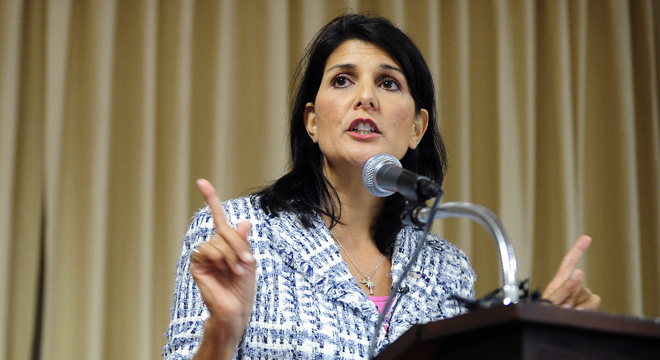Updated: Jan. 11, 11:45AM
South Carolina officials plan to file suit against the federal government because the Justice Department stopped the state from implementing a voter ID law that the state’s own statistics showed would have a disparate impact on non-white voters. Fighting on their behalf will be a former DOJ official who claimed that the Civil Rights Division is opposed to protecting the civil rights of whites and who defended the Bush-era politicalization of the division by Bradley Schlozman as an effort to “diversify.”
South Carolina has hired former Voting Section Chief Christopher Coates, who defied DOJ’s instructions and testified before the U.S. Commission on Civil Rights during the Republican-led probe into the infamous New Black Panther Party case, a spokesman for the South Carolina attorney general’s office told The State newspaper.
Former colleagues said that Coates had an ideological conversion after an African-American woman was chosen over him as deputy section chief in July of 2000. Schlozman, who was found to have hired lawyers for their conservative credentials and referred to liberals as “commies” and “mold spores,” called Coates a “true member of the team.”
Coates signed off on the New Black Panther Party case, which was just the fourth known voter intimidation case brought under Section 11(b) of the Voting Rights Act in its history, the second in defense of white voters (though, in the New Black Panther Party case, lawyers weren’t able to find any victims). The case became a political issue after most of the allegations were dropped, except against a member of the party who was holding a billy club.
“Many of these groups on the issue of race-neutral enforcement of the VRA frankly have not pursued the goal of equal protection of law for all people,” Coates said in his prepared testimony before the Civil Rights Commission. “Instead, many of these groups act… not as civil rights groups, but as special interest lobbies for racial and ethnic minorities and demand, not equal treatment, but enforcement of the VRA only for racial and language minorities.”
Coates said that when he became chief of the Voting Section he began asking applicants if “they would be willing to work on cases that involved claims of racial discrimination against white voters.” He said that the election of Obama “brought to positions of influence and power within the [Civil Rights Division] many of the very people who had demonstrated hostility to the concept of equal enforcement of the VRA.” He said that many in the division had a “deep-seated opposition to the equal enforcement of the VRA against racial minorities and for the protection of whites who had been discriminated against.”
A DOJ Office of Professional Responsibility report on the New Black Panther Party case found that the case was decided “based upon a good-faith assessment of the facts and the law” and found no evidence that race or partisan politics were a factor in the decision.
South Carolina has also brought on former Solicitor General Paul Clement, a face well known to the justices on the Supreme Court — he argued a Texas redistricting case there just this week — where the case could ultimately end up. Legal observers expect that South Carolina will mount a constitutional challenge to Section 5 of the Voting Rights Act, which requires states with a history of racial discrimination like South Carolina to have their election laws precleared by officials in D.C.
South Carolina Attorney General Alan Wilson said the suit would be filed in D.C. court in the “next week or two.” He was joined by other Republican leaders at a press conference on Tuesday, where Gov. Nikki Haley called the voter ID law a “very important and pressing issue,” though, when asked, she did not name any instances where voter fraud could have been prevented by a law requiring a DMV-issued photo ID. Haley argued that if pharmacies require photo ID to buy Sudafed, the state should be able to require photo ID to vote.
“What are you scared of?” Haley said, addressing critics of the proposal who point to statistics indicate that the law will have a disparate impact on minority (and typically Democratic-leaning) voters. “We’re not going to take the time to figure it out. This is common sense legislation.”
“The Department of Justice made the right decision on the facts and law when it denied Section 5 preclearance to South Carolina’s photo ID law,” Lawyers’ Committee for Civil Rights Under Law Executive Director Barbara Arnwine said in a statement. “We are confident that the D.C. Court will reach the same conclusion.”
Video of the press conference is embedded below.









